Ditapis dengan
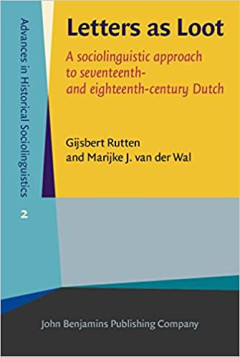
Letters as loot :a sociolinguistic approach to seventeenth- and eighteenth-ce…
The study of letter writing is at the heart of the historical-sociolinguistic enterprise. Private letters, in particular, offer an unprecedented view on language history. This book presents an in-depth study of the language of letters focussing on a unique collection of Dutch private letters from the seventeenth and eighteenth centuries, which comprises letters from the lower, middle and upper …
- Edisi
- -
- ISBN/ISSN
- 9789027269577
- Deskripsi Fisik
- xiii, 426p. : ill.
- Judul Seri
- -
- No. Panggil
- 306.44 RUT l
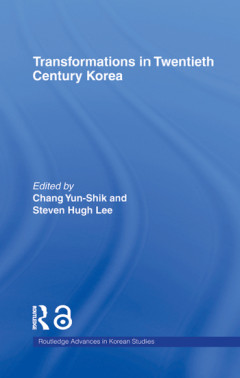
Transformations in twentieth century Korea
This edited collection traces the social, economic, political, and cultural dimensions of Korea’s dramatic transformation since the late nineteenth century. Taking an interdisciplinary approach, the chapters examine the internal and external forces which facilitated the transition towards industrial capitalism in Korea, the consequences and impact of social change, and the ways in which Korea…
- Edisi
- -
- ISBN/ISSN
- 9780203968277
- Deskripsi Fisik
- xiii, 380p. : ill.
- Judul Seri
- -
- No. Panggil
- 330.95195043 TRA t
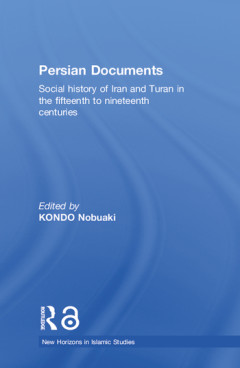
Persian documents :social history of Iran and Turan in the fifteenth to ninet…
After the Mongol period, Persian was the official written language in Iran, Central Asia and India. A vast amount of documents relating to administration and social life were produced and yet, unlike Ottoman and Arabic documents, Persian historical resources have received very little critical attention. This book is the first to use Persian Documents as the sources of social history in Early Mo…
- Edisi
- -
- ISBN/ISSN
- 9780203508862
- Deskripsi Fisik
- xvii, 189p. : ill.
- Judul Seri
- -
- No. Panggil
- 955.03 PER p

A world of fiction :digital collections and the future of literary history
During the 19th century, throughout the Anglophone world, most fiction was first published in periodicals. In Australia, newspapers were not only the main source of periodical fiction, but the main source of fiction in general. Because of their importance as fiction publishers, and because they provided Australian readers with access to stories from around the world—from Britain, America and …
- Edisi
- -
- ISBN/ISSN
- 9780472130856
- Deskripsi Fisik
- viii, 252p. : ill.
- Judul Seri
- -
- No. Panggil
- 809.3034 BOD a
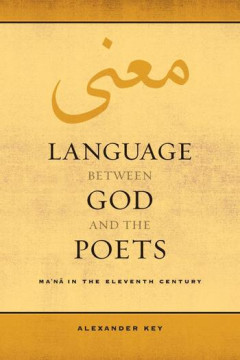
Language between God and the poets :ma'ná in the eleventh century
How does language work? How does language produce truth and beauty? Eleventh-century Arabic scholarship has detailed answers to these universal questions. Language Between God and the Poets reads the theory of four major scholars and asks how the conceptual vocabulary they shared enabled them to create theory in lexicography, theology, logic, and poetics. Their ideas engaged God and poetry at t…
- Edisi
- -
- ISBN/ISSN
- 9780520298019
- Deskripsi Fisik
- xvi, 280p. : ill.
- Judul Seri
- -
- No. Panggil
- 181.92 KEY l
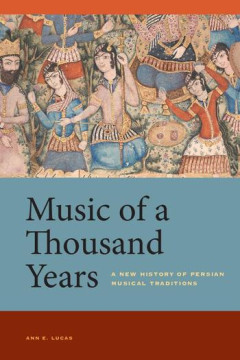
Music of a thousand years :a new history of Persian musical traditions
"Iran’s particular system of traditional Persian art music has been long treated as the product of an ever-evolving, ancient Persian culture. In Music of a Thousand Years, Ann E. Lucas argues that this music is a modern phenomenon indelibly tied to changing notions of Iran’s national history. Rather than considering a single Persian music history, Lucas demonstrates cultural dissimilarity a…
- Edisi
- -
- ISBN/ISSN
- 9780520300804
- Deskripsi Fisik
- xviii, 265p. : ill
- Judul Seri
- -
- No. Panggil
- 780.955 LUC m
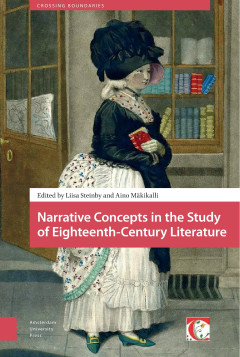
Narrative concepts in the study of eighteenth-century literature
This collection of essays studies the encounter between allegedly ahistorical concepts of narratology and eighteenth-century literature. It questions whether the general concepts of narratology are as such applicable to historically specific fields, or whether they need further specification. Furthermore, at issue is the question whether the theoretical concepts actually are, despite their appe…
- Edisi
- -
- ISBN/ISSN
- 9789048527380
- Deskripsi Fisik
- 314p. : ill.
- Judul Seri
- -
- No. Panggil
- 820.9005 NAR n

Culture & money in the nineteenth century:abstracting economics
Since the 1980s, scholars have made the case for examining 19th-century culture, particularly literary output, through the lens of economics. Bivona and Tromp have collected contributions that push New Economic Criticism in new directions.Spanning the Americas, India, England, and Scotland, this volume adopts a global view of the cultural effects of economics and exchange. Contributors use the …
- Edisi
- -
- ISBN/ISSN
- 9780821421963
- Deskripsi Fisik
- viii, 230 pages ; 24 cm.
- Judul Seri
- -
- No. Panggil
- 306.009034 BIV c
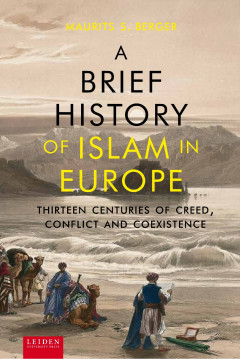
A brief history of Islam in Europe :thirteen centuries of creed, conflict and…
This book presents an overall presentation and discussion of developments ever since Islam appeared on the European stage thirteen centuries ago. The events and stories presented increase the understanding of present debates on, and notions of, Islam and Muslims in Europe. This book shows that in the course of thirteen centuries the Muslim as well as Islam have undergone many metamorphoses. The…
- Edisi
- -
- ISBN/ISSN
- 9789087283261
- Deskripsi Fisik
- 354p. : ill.
- Judul Seri
- -
- No. Panggil
- 297.094 BER b

Healthy minds in the twentieth century :in and beyond the asylum
This open access edited collection contributes a new dimension to the study of mental health and psychiatry in the twentieth century. It takes the present literature beyond the ‘asylum and after’ paradigm to explore the multitude of spaces that have been permeated by concerns about mental well-being and illness. The chapters in this volume consciously attempt to break down institutional wal…
- Edisi
- -
- ISBN/ISSN
- 9783030272753
- Deskripsi Fisik
- xiii, 274p. : ill.
- Judul Seri
- -
- No. Panggil
- 362.1 HEA h

Virtue Ethics and Education from Late Antiquity to the Eighteenth Century
This book argues that premodern societies were characterized by the quest for “virtue.” The concept of virtue, complicated and much fought-over, permeated society, encouraging wisdom, courage, and justice, while simultaneously legitimizing social hierarchies based on sex and nationality. By examining pedagogical texts, rituals, performances, and images, this book illuminates the evolution o…
- Edisi
- -
- ISBN/ISSN
- 9789048535101
- Deskripsi Fisik
- 374 p.; 22 cm.
- Judul Seri
- -
- No. Panggil
- 307.72 VIR v

Shaping natural history and settler society :Mary Elizabeth Barber and the ni…
This book explores the life and work of Mary Elizabeth Barber, a British-born settler scientist who lived in the Cape during the nineteenth century. It provides a lens into a range of subjects within the history of knowledge and science, gender and social history, postcolonial, critical heritage and archival studies. The book examines the international importance of a marginalized scientist, th…
- Edisi
- -
- ISBN/ISSN
- 9783030226398
- Deskripsi Fisik
- xxiv, 360p. : ill.
- Judul Seri
- -
- No. Panggil
- 968.703092 HAM s

The Heritage of Arung Palakka:a history of South Sulawesi (Celebes) in the se…
A History of South Sulawesi in the seventeeth century
- Edisi
- -
- ISBN/ISSN
- 9789004287228
- Deskripsi Fisik
- ix, 353 p., [9] p. of plates : maps ; 24 cm.
- Judul Seri
- -
- No. Panggil
- 959.84 AND t

Indic manuscript cultures through the ages. material, textual, and historical…
This collection of essays explores the history of the book in pre-modern South Asia looking at the production, circulation, fruition and preservation of manuscripts in different areas and across time. Edited by the team of the Cambridge-based Sanskrit Manuscripts Project and including contributions of the researchers who collaborated with it, it covers a wide range of topics related to South As…
- Edisi
- -
- ISBN/ISSN
- 9783110543100
- Deskripsi Fisik
- xviii, 783 p.; 22 cm.
- Judul Seri
- -
- No. Panggil
- 091 IND i

Anti-vivisection and the profession of medicine in Britain :a social history
This book explores the social history of the anti-vivisection movement in Britain from its nineteenth-century beginnings until the 1960s. It discusses the ethical principles that inspired the movement and the socio-political background that explains its rise and fall. Opposition to vivisection began when medical practitioners complained it was contrary to the compassionate ethos of their profes…
- Edisi
- -
- ISBN/ISSN
- 9781137556974
- Deskripsi Fisik
- xxi, 217p. : ill.
- Judul Seri
- -
- No. Panggil
- 179.4 BAT a

Sergei M. Eisenstein:notes for a general history of cinema
One of the iconic figures of the twentieth-century cinema, Sergei Eisenstein is best known as the director of The Battleship Potemkin, Alexander Nevskii and Ivan the Terrible. His craft as director and film editor left a distinct mark on such key figures of the Western cinema as Nicolas Roeg, Francis Ford Coppola, Sam Peckinpah and Akiro Kurosawa.This comprehensive volume of Eisenstein’s writ…
- Edisi
- -
- ISBN/ISSN
- 9789089648440
- Deskripsi Fisik
- -
- Judul Seri
- -
- No. Panggil
- 791.430233092 SER s
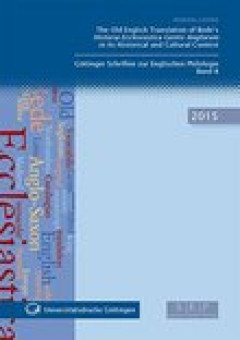
The Old English translation of Bede's Historia Ecclesiastica Gentis Anglorum …
Did King Alfred the Great commission the Old English translation of Bede’s Historia Ecclesiastica Gentis Anglorum, probably the masterpiece of medieval Anglo-Latin Literature, as part of his famous program of translation to educate the Anglo-Saxons? Was the Old English Historia, by any chance, a political and religious manifesto for the emerging ‘Kingdom of the Anglo-Saxons’? Do we deal w…
- Edisi
- -
- ISBN/ISSN
- 978386395189
- Deskripsi Fisik
- 411 p.
- Judul Seri
- -
- No. Panggil
- 274.2 LEM o

Gender, reading, and truth in the twelfth century
Female Spirituality; Courtly Romance; Use of images; Fiction; Exegesis; Vernacular Literature; Chrétien de Troyes; Wolfram von Eschenbach
- Edisi
- -
- ISBN/ISSN
- 9781641893787
- Deskripsi Fisik
- XII, 419 p.
- Judul Seri
- -
- No. Panggil
- 809.393581 POW g

Genealogy, archive, image :interpreting dynastic history in western India, c.…
The ethnographic approach to Indian history and genealogy; the making of dynastic history in the kingdom of Jhalavad; the history of Gujarat. ‘Genealogy, Archive, Image’ addresses the ways in which history and tradition are ‘reinvented’ through text, memory and painting. It examines the making of dynastic history in the kingdom of Jhalavad, situated in Gujarat, western India, over th…
- Edisi
- -
- ISBN/ISSN
- 9783110539455
- Deskripsi Fisik
- XVI, 278 p.
- Judul Seri
- -
- No. Panggil
- 954.75 JHA, g

Material culture in modern diplomacy from the 15th to the 20th century
The present volume aims at outlining a new field of research with regard to the history of diplomacy: the material culture of diplomatic interaction in early modern and modern times. The material culture of diplomacy includes all practices in foreign policy communication in which single artifacts, samples of artifacts, or else the whole material setting of diplomatic interaction is supposed to …
- Edisi
- -
- ISBN/ISSN
- 9783110463217
- Deskripsi Fisik
- VI, 176 p.
- Judul Seri
- -
- No. Panggil
- 327.20903 MAT m
 Karya Umum
Karya Umum  Filsafat
Filsafat  Agama
Agama  Ilmu-ilmu Sosial
Ilmu-ilmu Sosial  Bahasa
Bahasa  Ilmu-ilmu Murni
Ilmu-ilmu Murni  Ilmu-ilmu Terapan
Ilmu-ilmu Terapan  Kesenian, Hiburan, dan Olahraga
Kesenian, Hiburan, dan Olahraga  Kesusastraan
Kesusastraan  Geografi dan Sejarah
Geografi dan Sejarah